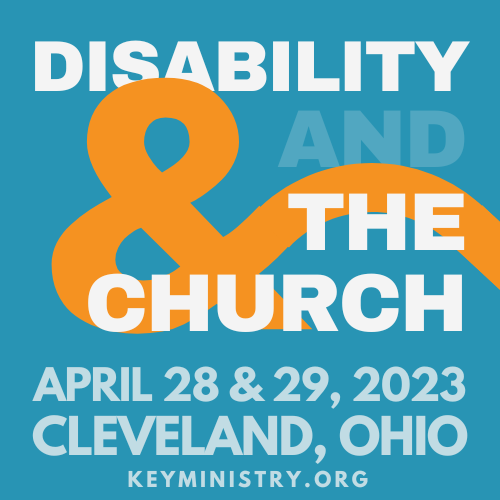In this week's episode, Beth Golik shares four thoughts about nonverbal communication in the children's ministry setting and how she has been personally impacted by her students whose primary mode of communication doesn't include the spoken word.
Listen now in your favorite podcast app!
Quick Links:
Disability Ministry Video Roundtable Event Recordings
DATC Workshops & QuickTakes List
ASHA Augmentative and Alternative Communication (AAC)
If you enjoyed this episode, you may also like:
015: Seven Muti-Sensory Strategies for Memorizing Scripture with Beth Golik
006: Visual Schedules with Beth Golik
Transcript:
Welcome to this week’s episode of Key Ministry: The Podcast. I’m one of your cohosts, Beth Golik, and today I’d like to share a few thoughts with you from my experience working in the Sunday morning children’s ministry setting with several students who are considered minimally-verbal or nonverbal.
By the way, I know that not everyone agrees with each other on some of the terms and language that is used to discuss disability. I’m using the term minimally-verbal to describe students who do not use the spoken word as their primary mode of communication; their speech level would be considered significantly below that of their peers.
Some individuals—children and adults—rely primarily on nonspeaking methods of communication for a variety of reasons including autism, cerebral palsy, learning difficulties, apraxia or dyspraxia, and selective mutism.
Sidenote: If you are listening to this podcast episode the week that it launches, then I invite you to join us for the next Disability Ministry Video Roundtable hosted by Key Ministry. On February 15, we are going to share ideas about how the church can best engage those with limited verbal communication so that they are using their gifts to be active and valued members of the Body of Christ. I’m looking forward to learning more during that roundtable and I encourage those with personal experience to contribute to the information-sharing.
In the meantime, in today’s podcast, I’d like to share four thoughts with you. Although I’m sharing mainly from a kid-min perspective, I believe these ideas translate outside the Sunday School classroom.
1: Communication is more than just verbal communication.
The American Speech-Language-Hearing Association defines Augmentitive and Alternative Communication, or AAC, as all of the ways that someone communicates besides talking.
Even those of us who primarily rely on the spoken word to communicate still use nonverbal communication. Some examples of nonverbal communication include facial expressions, gestures, and eye gaze. We can learn a lot about what a person is feeling by paying attention to their body language and behavior. Your nonspeaking students have information that they want and need to communicate, so pay attention to their nonverbal clues.
2: Always presume competence.
Nonspeaking does not mean non-thinking. Many individuals with nonverbal autism, for instance, understand spoken and written words and may use written words to communicate. In addition to the no-tech or low-tech AAC such as writing or pointing to pictures or words, there are high-tech options such as iPad apps and speech-generating devices. Be open to learning how each student in your ministry setting best learns and communicates.
3: Provide opportunities for engagement and response.
Be creative about how you are eliciting responses from your students as you are teaching about God’s big story and helping them grow in their relationship with Jesus. Answers do not need to be given verbally. Hands-on activities, such as matching pictures or icons to key concepts, work not just for our nonverbal communicators, but also for the younger kids in our children’s ministry who might be pre-readers. Using sign language to learn a memory verse, actual ASL or modified, is a way all kids can learn and share their knowledge of Scripture.
You know, now might be a good time for me to mention Key Ministry’s upcoming conference, Disability & The Church, that’s DATC2023, which is taking place in Cleveland, Ohio on April 28 & 29, 2023. The Rev. Dr. Karen Roberts and I are going to be co-teaching a workshop at DATC2023 called Multi-sensory Strategies to Foster Children's Spiritual Formation. That workshop will equip you with some tools and sample materials to take back to your church. I hope you’ll join us! Visit keyministry.org/datc2023 for info and to register.
OK, back to the podcast! Let’s recap:
First, communication is more than just spoken words.
Second, always presume competence.
Third, provide opportunities for engagement and response.
The fourth and final thought I want to share with you today is to recognize and celebrate each person’s gifts.
You do not need to have spoken words to serve the Body of Christ. Each of your students has something to contribute. I have the honor of worshiping with a number of students each Sunday morning, elementary age through adult, who have very few spoken words to share but have incredible hearts for worship. Through their dance and movement, they model the freedom and unbridled joy we should all feel as children of God worshiping our heavenly Father. I am grateful for the example they set for me and for the other students in our inclusive children’s ministry setting. No words required.
Thank you for joining me for today’s episode of Key Ministry: The Podcast. Please subscribe on your favorite podcast app so you don’t miss an episode. And I’d love for you to join me at Disability & The Church, the national disability ministry conference Key Ministry is hosting in April in collaboration with the Tim Tebow Foundation. Visit keyministry.org/datc2023 for ticket pricing and the full lineup of speakers.






